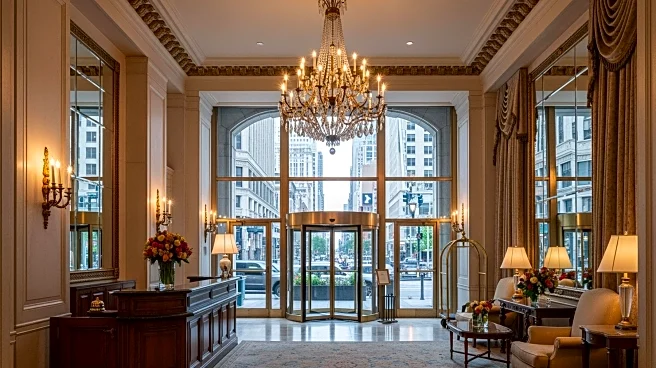What's Happening?
The U.S. hotel real estate market is experiencing a slowdown in transactions due to a significant gap between seller expectations and buyer willingness. Industry experts at the Lodging Conference in Phoenix
highlighted the need for sellers to adjust their pricing strategies to stimulate market activity. The disconnect between pre-pandemic valuations and current buyer offers has led to a slump in sales, with transactions for higher-priced properties stalling. Michael Bernath from Peachtree Group noted that deals priced around $40 million or less are more likely to attract buyers, while larger transactions face increased pressure. The market currently lacks a dominant group of buyers, as foreign capital, REITs, and major private equity firms are seeking better opportunities in other real estate sectors. This has resulted in a fragmented market where hotel sales occur sporadically, often as smaller, individual transactions.
Why It's Important?
The stagnation in the U.S. hotel real estate market has broader implications for the industry and related sectors. The lack of major buyers and the disconnect in pricing expectations could lead to prolonged periods of unsold properties, affecting refinancing and capital investment strategies. This situation may pressure sellers to lower their price expectations, potentially impacting the valuation of hotel assets across the country. Additionally, the slowdown in transactions could hinder the recovery of the hotel industry post-pandemic, affecting employment and economic activity in regions reliant on tourism and hospitality. However, certain markets like San Francisco, Washington, D.C., and Austin, Texas, are seen as having growth potential, which could provide opportunities for revitalization.
What's Next?
As the U.S. hotel market navigates these challenges, sellers may need to reassess their pricing strategies to align with current buyer expectations. Industry leaders emphasize the importance of bridging the bid-ask gap to reignite transactions and stimulate market activity. Upcoming events such as the Super Bowl and FIFA World Cup 2026 in San Francisco are expected to catalyze increased activity, potentially attracting more buyers. Cities like Washington, D.C., and Austin, Texas, identified as attractive markets, may see increased interest due to appealing pricing levels and ongoing infrastructure developments. The focus remains on encouraging acquisitions by becoming more realistic in pricing.
Beyond the Headlines
The current stagnation in the hotel real estate market may lead to long-term shifts in investment strategies within the sector. As major buyers seek opportunities in other real estate sectors, the hotel industry might need to innovate and adapt to changing market dynamics. This could involve exploring alternative financing models or partnerships to facilitate transactions. Additionally, the emphasis on realistic pricing could influence future valuation standards, potentially reshaping the landscape of hotel investments.











